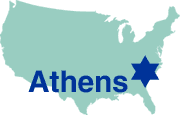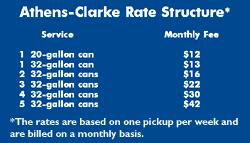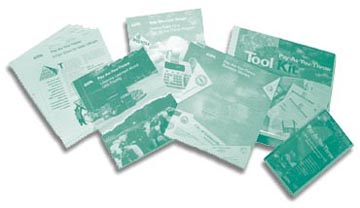PAYT Bulletin: Winter 2000
The PAYT Bulletin is designed to help solid waste planners and others get the latest pay-as-you-throw news and events. Use the links below to read articles from the Winter 2000 issue. To review other issues of the Bulletin, use the links on the right side of this page.
Other issues
- Could PAYT Offer Hope For New York City's Recycling Program? (Winter 2003)<
- PAYT Helps Cities Protect Climate (Summer 2002)
- Large Cities and PAYT (Winter 2002)
- Bigger, Older, Wiser: (Summer 2001)
- Maine Turns to PAYT (Spring 2001) State and City Profiles (Summer 2000)
- PAYT From Sea to Shining Sea (Winter 2000)
- PAYT Bulletin Archives
- PAYT From Sea to Shining Sea
- Sweet Success in the City of Roses - Portland, Oregon
- The Other Portland - Portland, Maine
- Athens-Clark County, Georgia
- Everything You Ever Wanted to Know About PAYT
- Stay Tuned for More on PAYT
PAYT From Sea to Shining Sea
From the Pacific Northwest to the heart of the South and up the East Coast, PAYT is thriving. This issue of the Bulletin chronicles the rate setting activities of Portland, Oregon, and the implementation process in Athens-Clarke County, Georgia. It also provides a glimpse of the brand new program in Portland, Maine.
Sweet Success in the City of Roses

Implementation of PAYT in Portland, Oregon, came with the city's founding. That does not mean, however, the city does not still strive to improve its program. In 1992, with the regulation of the residential waste industry, the city had to streamline how solid waste was collected. Portland took a free-market system that worked and made it better-the haulers were franchised, the city began setting collection rates, and now everything's coming up roses.
Setting an Equitable Rate
Portland has had a unique advantage when it comes to operating an equitable waste collection system—since the city's founding, privately owned waste haulers have always charged variable rates to Portland's residents. Because the franchise system took away the residents' ability to choose their waste collection provider, Lee Barrett of the Solid Waste and Recycling Division believes the city "[has] an obligation to watch the costs for them." The division, therefore, sets the rates charged by the franchise to customers. Portland's 500,000 residents still pay a variable fee according to the size of can they set out; each resident pays a flat rate for yard trimmings collection and recycling. "Politically, [a variable rate] program can be difficult, and Portland was lucky to not have that problem," acknowledges Barrett.
Each year, Portland conducts a rate review that takes into account all the variables that affect waste collection costs, such as tipping fees, labor contracts, and fuel prices. The division uses a part-time economist to help calculate the rates. Every year staff weigh containers from clusters of 110 representative households and calculate the average of those weights. Average weights are calculated in this manner for each of the six container sizes available to residents. Staff also randomly select 20 of the 43 haulers for an audit of their financial records to determine their "true costs" for residential collection. The true costs and the average weights are then used to determine the rates. The Division of Solid Waste tries to set the rates so that the haulers have the opportunity to make a 9.5 percent profit, although the division does not guarantee this. "We spend a good 2 to 3 months a year on our rate-setting process in order to make it fair not just to the rate payer, but also to the service provider," says Barrett.
Residents have a choice of weekly collection using containers ranging from a 20-gallon minican to a 90-gallon roll cart or monthly collection of one 32-gallon can. Most residents select weekly collection of a 32-gallon can. There is a disincentive charge, typically $2 to $3, for the 90-gallon roll cart to encourage residents to use smaller containers. In addition, residents are given a recycling rebate based on the sale of recyclables. For fiscal year (FY) 2000, residents will get a weekly $0.15 credit on their bill.
Each franchise bills their own customers and pays a franchise fee to the city, which entirely supports the budget of the Solid Waste and Recycling Division. The franchise fee covers the budget of the residential program, while the commercial program is paid through a commercial tonnage fee. The division has the authority to charge up to 5 percent of the disposal portion of haulers' costs, which it did in the first year of the program. The division found this money more than covered their needs, so it has since adjusted the fee to 3.5 percent.
Although the rates in the franchise system are based on the average weights of containers, residents perceive the rate as being set by the size of the container. One of the major difficulties has been when residents overload their containers and become frustrated when the containers are not picked up by the hauler because of the excessive weight. Education and repeated communication on the part of the Solid Waste and Recycling Division have been key strategies to inform customers that the weight drives the rate.
Portland's Progress
Evidence shows that, on average, residents are reducing the amount of waste they produce. In FY 1995, for example, a typical resident's 20-gallon minican weighed an average of 15.90 pounds and in FY 1998, the 20-gallon minican weighed an average of 13.63 pounds. Overall, solid waste collected per household per year has decreased by 273 pounds between 1991 and 1998, while collection of recyclables has increased by 437 pounds per household per year. In 1996, the American Forest and Paper Association recognized Portland's curbside paper recycling program as the best in the nation among cities with more than 100,000 residents. "It works," concludes Barrett. "It might sting a little...but if a city wants to reduce the amount of waste disposed of, showing residents the correlation between waste generation and cost works. I don't know of any case where the amount of material disposed of went up."
The Other Portland
Ensuring that its namesake in the northwest isn't the only Portland with PAYT, Portland, Maine (population 64,000), started its program in July 1999. Portland uses a proportional system in which residents purchase bags for $0.68 each. Before PAYT, the city did not have curbside recycling and its recycling rate was 7 percent. Increasing that rate was the impetus for switching to unit pricing, and the city has not been disappointed. Portland has seen its recycling rate jump to 35 percent and its total waste tonnage decrease by 80 to 100 tons per week. The city established a hotline 3 months prior to implementation to answer questions and explain the program. "Compliance has been fantastic. Even those residents who were initially opposed became proponents once they understood how it worked," reports Troy Moon, commercial waste program administrator. For more information on Portland's program, contact Moon at 207 874-8801.
Athens-Clarke County-A Southern Perspective

Athens, Georgia, is equal parts bustling college town and charm- ing city of the old South. But don't mistake Athens for a city behind the times. In 1990, the city of Athens and the county of Clarke merged to form the unified government of Athens-Clarke County. Then, in 1994, shortly after moving from a tax-based fee to a flat rate for solid waste collection, the County Commission voted to implement a municipal PAYT program to encourage recycling and extend the life of its landfill.
The County Commission decided to implement PAYT only in the old city limits of Athens (population 40,000). The commission switched to PAYT to provide an economic incentive for residents to recycle more. At the time, the city was in the process of building a materials recovery facility (MRF), which opened in 1995, and the commission wanted to ensure that the MRF would have a steady stream of recyclables to process.
How Does It Work?
Under the variable-rate system, Athens-Clarke offers collection
service ranging from one 20-gallon can to five 32-gallon cans per
week. (See box for service rates.) Most residents of Athens-Clarke
have signed up for two 32-gallon cans. For overflow, residents can
purchase stickers for $2 to affix to their bags. 
At the same time it instituted the residential PAYT program, the commission also started a PAYT program in the downtown business district of Athens. In the commercial curbside program, downtown businesses use special trash bags that cost $1 each and can be purchased at three different municipal offices downtown. The cost of the bag pays for the cost of waste disposal. In addition to purchasing the bags, businesses pay a fixed monthly fee based on their collection frequency. Pickup schedules range from two times a week ($15 per month) to three times a day and twice on Sundays ($154 per month).
Making It Happen
"You can't have enough education," instructs Jim Corley, director of solid waste at the Athens-Clarke Solid Waste Department. For a full year before implementation, the Commission publicized the upcoming change to PAYT. From newspaper inserts and articles to formation of a citizens' advisory group to meetings with haulers to speeches to civic groups, the city left no stone unturned in getting the word out about PAYT.
Athens-Clarke has learned that education about PAYT must be ongoing, in large part due to the high turnover of university students. University of Georgia students make up 30 percent of Athens' population. Every year, the Solid Waste Department subscribes approximately 4,800 new households at the beginning of the school year and after the holiday break. Two years into the program, the county hired a customer service officer to help with public education. In addition to and providing tours to university classes, the Solid Waste Department publishes and distributes a resource guide at the beginning of the school year. The guide lists materials that can be recycled, hours of pickup, location of drop-off centers, and customer service hours of operation.
While relatively smooth, the switch to unit pricing was not complaint free. Before unification of Athens-Clarke County, residents paid for solid waste collection through the property tax. In 1992, the Commission began charging a flat fee for solid waste as part of the water bill. In the minds of many longtime residents, however, garbage collection had been "free" in the past and they didn't understand why there must be a charge for it now. Since this transition took time for some residents, Corley suggests hiring a compliance officer at the beginning of the program. "We didn't have any problems with illegal dumping, but we did have some people that refused to comply with the new program. It would have been easier if there had been someone dedicated to those issues from the start." Athens-Clarke hired a compliance officer 2 years after the inception of PAYT. The officer is in charge of notifying the offender of the compliance issue and educating them on what they need to do to comply in the future. If after three notifications the offender still does not comply, the matter is sent to the County Marshall for citation.
Educating residents was just one part of the PAYT curriculum for Athens-Clarke County. Instituting PAYT also meant the city's collection crews had to adjust to a new way of operating. Rather than picking up all set-outs, the crews had to learn to leave and report unauthorized cans and bags to the Solid Waste Department so that it could follow up with the resident.
The recycling rate in Athens-Clarke has increased every year since the beginning of PAYT. In FY 1996, the county collected an average of 357 tons of recyclables per month. In FY 1999, that number increased by 246 percent to 880 tons per month. In addition, the county was able to reduce its garbage truck fleet by two vehicles and consequently decrease its collection costs.
For more information on Athens-Clarke County's PAYT program, contact Jim Corley at 706 613-3501, extension 305.
Everything You Ever Wanted to Know About PAYT
With a simple click of your mouse or quick toll-free call, you
can be the proud new owner of the PAYT resource of your choice.
Order the booklet on rate structure design, the video on the nuts
and bolts of PAYT, a series of success stories, or the how-to guidebook.
Every one of these items is available to you at no cost simply by
calling the PAYT Helpline at 800 EPA-PAYT or visiting the PAYT Web
site.
Stay Tuned for More on PAYT
More than 150 community access cable channels across the country are scheduled to air the PAYT video, Pay-As-You-Throw: A New Trend in Sustainable Solid Waste Management. Check with your local channel to find out when PAYT will be on your airwaves.

![[logo] US EPA](../gif/logo_epaseal.gif)